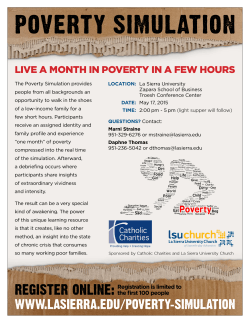
AB 43 (Stone, Eggman, Levine, McCarty, Thurmond
AB 43 (Stone, Eggman, Levine, McCarty, Thurmond): California Earned Income Tax Credit SUMMARY AB 43 addresses the lack of income gains for working Californians in the Post-Great Recession economic recovery while simultaneously providing a muchneeded economic stimulus in the most economically distressed communities. This bill establishes a refundable California Earned Income Tax Credit (EITC) for working low- and middle-class families. BACKGROUND The federal EITC is a refundable tax credit targeted at low- to middle-income working households that reduces poverty and rewards work. Researchers cite the federal EITC as among the most effective tools for reducing poverty across the nation. Without it, child poverty is estimated to be 25% higher. As the California Budget Project points out, for children, the federal EITC results in improved health and education outcomes that translate into higher incomes in adulthood. From 2010 to 2012, the federal EITC pulled 1.3 million people (629,000 children) above the federal poverty line within California. Twenty five states have already established their own EITC to magnify the impact of the federal EITC, although California has not done so. Studies focused on state EITCs adopted in other states have estimated that each additional dollar received by a tax filer can generate a further $1.50-2.00 in local economic activity. The impact of the increased purchasing power in communities benefited by federal and state EITC dollars is undeniable. In its analysis of policy options for economic and employment growth during 2010, the Congressional Budget Office highlights that the best options to foment growth are those that assist households by spurring demand for goods and services. Therefore, the type of tax credit provided by AB 43, which targets lower income households with fewer assets, would have a larger impact on consumer spending, in comparison with tax cuts aimed at higher income households. PROBLEM While our state and nation have benefited from strong trends in economic recovery following the Great Recession, low and middle-income households, for the most part, have been left out of income gains. The bottom three-fifths of the income distribution has experienced stagnating income gains while the top one-fifth of the income distribution has experienced gains of 52.4%. The communities hardest hit by the Great Recession have had little meaningful income growth and economic stimulus. In its report on the Supplemental Poverty Measure for 2013, the US Census Bureau reported California’s poverty rate at 23.4%, the highest rate among all 50 states. California needs to take bold steps to reduce the poverty rate of working families and improve the economic outlook on its impoverished communities. SOLUTION Given California’s poverty rate, and given that EITCs adopted in other states have a proven record in curbing the income gap at local level, it is time for California to adopt a state EITC. AB 43 establishes a refundable California Earned Income Tax Credit. A federal EITC-eligible household with at least one child under the age of five would receive a 35% augmentation to the federal credit, a childless EITC-eligible tax filer would receive a 60% augmentation, and all other federal EITC-eligible filers would receive a 15% augmentation. By specifically targeting certain eligible filers, a California EITC leverages the federal credit in the communities that need it the most. SUPPORT United Ways of California (SPONSOR) FOR MORE INFORMATION Contact: Alfredo Arredondo Office of Assemblymember Mark Stone Phone: (916) 319-2029 Fax: (916)-319-2129 alfredo.arredondo@asm.ca.gov
© Copyright 2025









